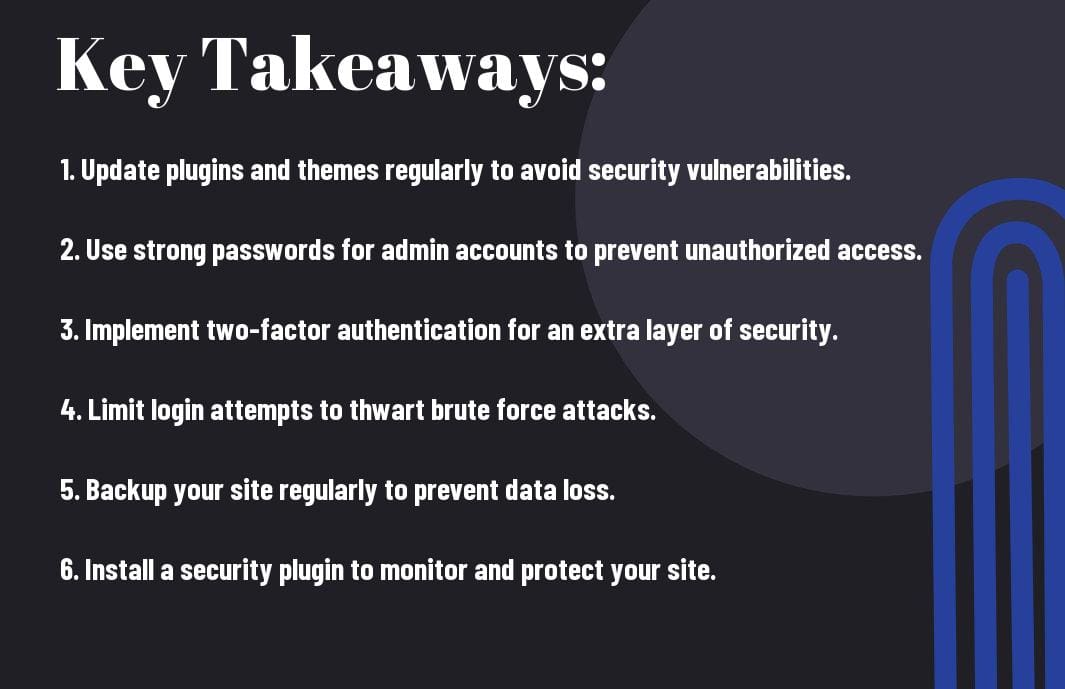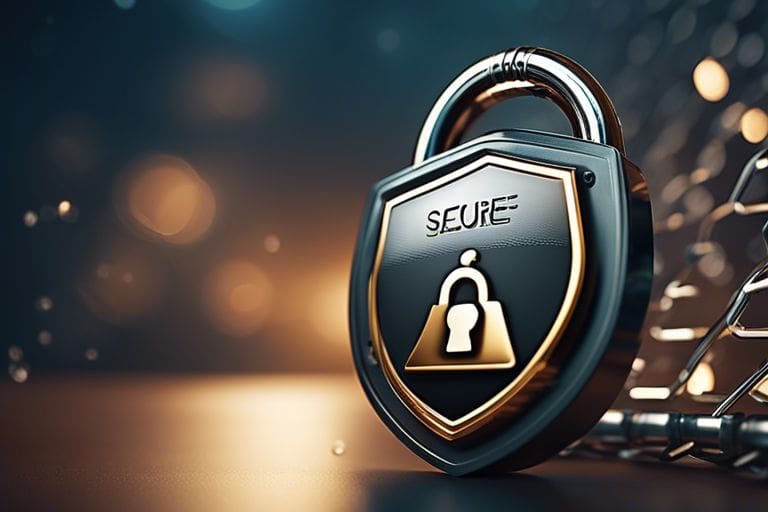Just owning a WordPress site is not enough; you need to prioritize security. With the rise in cyber threats, it is crucial to take proactive measures to protect your website from hackers, malware, and cyber attacks. This blog post will guide you through simple yet effective ways to enhance the security of your WordPress site, reducing the risk of potential breaches and keeping your valuable data safe.
Key Takeaways:
- Regular Updates: Always keep your WordPress site, themes, and plugins up to date to address any security vulnerabilities and ensure the latest security features are in place.
- Strong Passwords: Utilize strong and unique passwords for your WordPress site, including a mix of uppercase and lowercase letters, numbers, and special characters to prevent unauthorized access.
- Two-Factor Authentication: Enable two-factor authentication for an added layer of security, requiring a second form of verification in addition to your password to access your WordPress site.
Basics of WordPress Security
Importance of Regular Updates
A vital aspect of maintaining the security of your WordPress site is by ensuring regular updates. On average, WordPress releases updates to address security vulnerabilities, bugs, and to enhance performance. Failing to update your WordPress core, themes, and plugins can expose your site to potential security risks.
Benefits of Using Strong Passwords
Benefits of using strong passwords cannot be overstated. This simple practice acts as the first line of defense against unauthorized access to your site. Strong passwords should include a combination of uppercase and lowercase letters, numbers, and special characters. Implementing this measure significantly reduces the risk of brute force attacks.
This is particularly crucial for admin accounts, which have access to the site’s backend and sensitive information. Using weak passwords makes it easier for malicious actors to gain unauthorized access, jeopardizing the security of your entire site.
The Role of User Permissions
With user permissions, you can control the level of access each user has on your WordPress site. By assigning appropriate roles such as Administrator, Editor, Author, Contributor, or Subscriber, you can limit access to sensitive areas and reduce the likelihood of accidental changes or malicious activities.
It is imperative to regularly review and update user permissions to ensure that only authorized individuals have access to critical functions. Implementing a least privilege principle is a best practice to minimize the potential impact of a compromised account.

Advanced Security Measures
- Implementing Two-Factor AuthenticationOne effective way to enhance security on your WordPress site is by implementing two-factor authentication. This adds an extra layer of protection by requiring users to provide a second form of verification, such as a code sent to their mobile device, in addition to their password.
- Setting Up a Web Application FirewallAdvanced security measures can include setting up a web application firewall (WAF) to protect your WordPress site from malicious attacks. A WAF monitors and filters incoming traffic to block potential threats before they reach your site, helping to prevent hacks and data breaches.
- Regular Security Scans and MonitoringOn top of proactive security measures, regular security scans and monitoring are crucial for a WordPress site. Implementing scheduled scans and monitoring tools can help detect any security vulnerabilities or suspicious activities early on, allowing you to take immediate action to protect your site.
Backup and Recovery Strategies
Scheduling Regular Backups
One of the most crucial aspects of enhancing security on your WordPress site is to keep regular backups of your website’s data. By scheduling automated backups on a consistent basis, you ensure that if any security breaches or data loss occur, you can restore your site to a previous version without losing valuable information.
Secure Backup Storage Options
An important consideration when it comes to backups is ensuring that they are stored securely. It is necessary to have an offsite backup storage option to prevent any data loss in case of a server failure or a security breach. Using cloud storage services like Amazon S3, Google Drive, or Dropbox can provide a reliable and secure backup solution for your WordPress site.
Backup storage in the cloud offers an additional layer of security as these services often have built-in encryption and data redundancy measures to safeguard your website’s backups.
Efficient Recovery Processes
Efficient recovery processes are just as important as regular backups. Having a clear plan in place for quickly recovering your site in the event of a security incident can minimize downtime and potential data loss. Make sure to regularly test your backup files to ensure they are up to date and can be easily restored when needed.
It is recommended to have a step-by-step guide for recovery processes, detailing how to access your backups and restore your site in various scenarios, such as malware attacks or server failures.
Best Practices for Ongoing Security
Choosing Secure Hosting Services
One crucial step in enhancing security for your WordPress site is selecting a reliable hosting provider that prioritizes security measures. Choosing a hosting service with robust security protocols, regular backups, and proactive monitoring can help safeguard your website from potential threats.
Keeping Themes and Plugins Updated
Themes and plugins play a vital role in the functionality and design of your WordPress site. Regularly updating themes and plugins is crucial to patching security vulnerabilities and ensuring the overall security of your website.
Ongoing monitoring of updates and promptly installing them can significantly reduce the risk of your site being compromised by cyber attacks.
Educating Users About Security Awareness
Services should focus on educating all users with access to the WordPress site about security best practices and the importance of maintaining strong passwords, enabling two-factor authentication, and recognizing phishing attempts.
Secure user behavior is a critical component of overall website security, and by raising awareness and providing guidance, you can empower users to actively contribute to the protection of your WordPress site.

Final Words
From above, it is clear that implementing simple security measures can significantly enhance the protection of your WordPress site. By regularly updating your plugins, themes, and WordPress core, utilizing strong passwords, and installing security plugins, you can safeguard your site from potential threats and attacks. Additionally, enabling two-factor authentication and limiting login attempts can further fortify your site’s defenses. By following these simple steps, you can create a safer online environment for your website and its users. Stay proactive and vigilant in monitoring your site’s security to ensure continued protection against cyber threats.
FAQ
Q: Why is enhancing security on a WordPress site important?
A: Enhancing security on your WordPress site is crucial to protect your website from cyber attacks, data breaches, and unauthorized access. By implementing security measures, you can safeguard sensitive information, maintain the trust of your visitors, and ensure the integrity of your site.
Q: What are some simple ways to enhance security on a WordPress site?
A: Some simple ways to enhance security on your WordPress site include keeping your themes and plugins updated, using strong passwords, enabling two-factor authentication, limiting login attempts, conducting regular security audits, and implementing a Web Application Firewall (WAF).
Q: How can I stay informed about the latest security threats and best practices for WordPress security?
A: To stay informed about the latest security threats and best practices for WordPress security, you can subscribe to security blogs, follow WordPress security experts on social media, join online security communities, attend security webinars and conferences, and sign up for security alerts from reputable sources.




